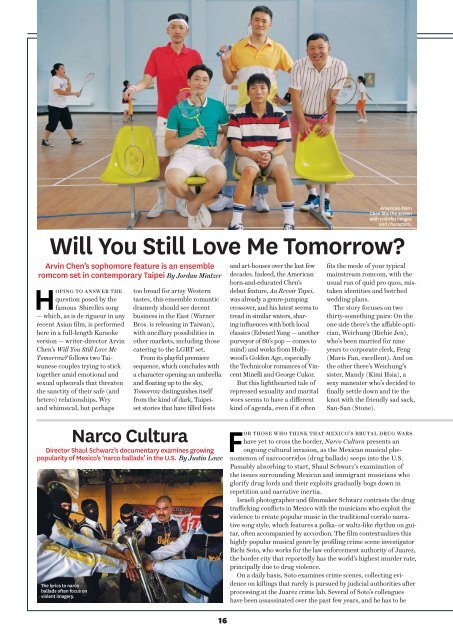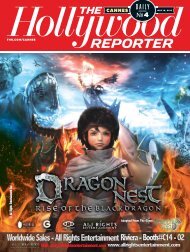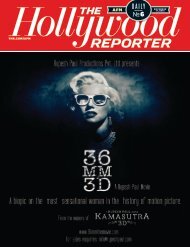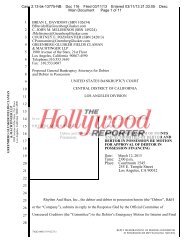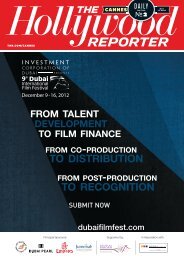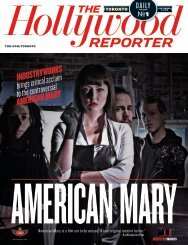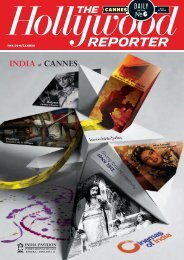the Day 5 'Daily' - The Hollywood Reporter
the Day 5 'Daily' - The Hollywood Reporter
the Day 5 'Daily' - The Hollywood Reporter
You also want an ePaper? Increase the reach of your titles
YUMPU automatically turns print PDFs into web optimized ePapers that Google loves.
Hoping to answer <strong>the</strong><br />
question posed by <strong>the</strong><br />
famous Shirelles song<br />
— which, as is de rigueur in any<br />
recent Asian film, is performed<br />
here in a full-length Karaoke<br />
version — writer-director Arvin<br />
Chen’s Will You Still Love Me<br />
Tomorrow? follows two Taiwanese<br />
couples trying to stick<br />
toge<strong>the</strong>r amid emotional and<br />
sexual upheavals that threaten<br />
<strong>the</strong> sanctity of <strong>the</strong>ir safe (and<br />
hetero) relationships. Wry<br />
and whimsical, but perhaps<br />
too broad for artsy Western<br />
tastes, this ensemble romantic<br />
dramedy should see decent<br />
business in <strong>the</strong> East (Warner<br />
Bros. is releasing in Taiwan),<br />
with ancillary possibilities in<br />
o<strong>the</strong>r markets, including those<br />
catering to <strong>the</strong> LGBT set.<br />
From its playful premiere<br />
sequence, which concludes with<br />
a character opening an umbrella<br />
and floating up to <strong>the</strong> sky,<br />
Tomorrow distinguishes itself<br />
from <strong>the</strong> kind of dark, Taipeiset<br />
stories that have filled fests<br />
16<br />
and art-houses over <strong>the</strong> last few<br />
decades. Indeed, <strong>the</strong> American<br />
born-and-educated Chen’s<br />
debut feature, Au Revoir Tapei,<br />
was already a genre-jumping<br />
crossover, and his latest seems to<br />
tread in similar waters, sharing<br />
influences with both local<br />
classics (Edward Yang — ano<strong>the</strong>r<br />
purveyor of 60’s pop — comes to<br />
mind) and works from <strong>Hollywood</strong>’s<br />
Golden Age, especially<br />
<strong>the</strong> Technicolor romances of Vincent<br />
Minelli and George Cukor.<br />
But this ligh<strong>the</strong>arted tale of<br />
repressed sexuality and marital<br />
woes seems to have a different<br />
kind of agenda, even if it often<br />
American-born<br />
Chen fills <strong>the</strong> screen<br />
with colorful images<br />
and characters.<br />
Will You Still Love Me Tomorrow?<br />
Arvin Chen’s sophomore feature is an ensemble<br />
romcom set in contemporary Taipei By Jordan Mintzer<br />
Narco Cultura<br />
Director Shaul Schwarz’s documentary examines growing<br />
popularity of Mexico’s ‘narco ballads’ in <strong>the</strong> U.S. By Justin Lowe<br />
<strong>The</strong> lyrics to narco<br />
ballads often focus on<br />
violent imagery.<br />
fits <strong>the</strong> mode of your typical<br />
mainstream romcom, with <strong>the</strong><br />
usual run of quid pro quos, mistaken<br />
identities and botched<br />
wedding plans.<br />
<strong>The</strong> story focuses on two<br />
thirty-something pairs: On <strong>the</strong><br />
one side <strong>the</strong>re’s <strong>the</strong> affable optician,<br />
Weichung (Richie Jen),<br />
who’s been married for nine<br />
years to corporate clerk, Feng<br />
(Mavis Fan, excellent). And on<br />
<strong>the</strong> o<strong>the</strong>r <strong>the</strong>re’s Weichung’s<br />
sister, Mandy (Kimi Hsia), a<br />
sexy maneater who’s decided to<br />
finally settle down and tie <strong>the</strong><br />
knot with <strong>the</strong> friendly sad sack,<br />
San-San (Stone).<br />
For those who think that Mexico’s brutal drug wars<br />
have yet to cross <strong>the</strong> border, Narco Cultura presents an<br />
ongoing cultural invasion, as <strong>the</strong> Mexican musical phenomenon<br />
of narcocorridos (drug ballads) seeps into <strong>the</strong> U.S.<br />
Passably absorbing to start, Shaul Schwarz’s examination of<br />
<strong>the</strong> issues surrounding Mexican and immigrant musicians who<br />
glorify drug lords and <strong>the</strong>ir exploits gradually bogs down in<br />
repetition and narrative inertia.<br />
Israeli photographer and filmmaker Schwarz contrasts <strong>the</strong> drug<br />
trafficking conflicts in Mexico with <strong>the</strong> musicians who exploit <strong>the</strong><br />
violence to create popular music in <strong>the</strong> traditional corrido narrative<br />
song style, which features a polka- or waltz-like rhythm on guitar,<br />
often accompanied by accordion. <strong>The</strong> film contextualizes this<br />
highly popular musical genre by profiling crime scene investigator<br />
Richi Soto, who works for <strong>the</strong> law enforcement authority of Juarez,<br />
<strong>the</strong> border city that reportedly has <strong>the</strong> world’s highest murder rate,<br />
principally due to drug violence.<br />
On a daily basis, Soto examines crime scenes, collecting evidence<br />
on killings that rarely is pursued by judicial authorities after<br />
processing at <strong>the</strong> Juarez crime lab. Several of Soto’s colleagues<br />
have been assassinated over <strong>the</strong> past few years, and he has to be<br />
day5_rev_spread3A.indd 1 2/10/13 5:20 PM


